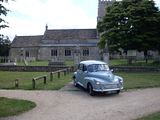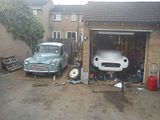Hi all, ive recently got mona so a showable standard and im pondering ideas for the next project. Ive recently bought a 2 stroke bike (mainly to get to work but also to get looking a bit fancy too) and its hit home just how nice minors are to work on.
This has made me think of consolidating a few future projects into one humble minor.
I used to drive a 2000 polo that I set up so it was pulling 1 lateral G and could pull stoppies at one point. Ive always thought about building another with some grunt this time.
Heres my idea. Build a minor that really handles (not firured this bit out yet) with some decent poke and get it to a level where it can be tracked and driven on the road.
Is there any semi competitive classes that I could enter with a modified minor? what are the limiting factors/ regulations?
I would prefer a tarmac class as pure rallying gets costly if you bin it.
p.s. castle coombe is less than 1/2 hr away ;) but the car will see quite a lot of road use, although almost certainly not a daily driver.
thanks
track use
Forum rules
By using this site, you agree to our rules. Please see: Terms of Use
By using this site, you agree to our rules. Please see: Terms of Use
-
MarkyB
- Minor Maniac
- Posts: 7845
- Joined: Thu Jan 25, 2007 3:18 pm
- Location: South East London
- MMOC Member: No
The CLASSIC SALOON CAR CLUB might be a good starting point.
If you look herehttp://www.classictouringcars.com/pages/rolhon.asp
It looks like people have campaigned Minors with some success.
Homepage is here:
http://www.classictouringcars.com/index.asp
If you look herehttp://www.classictouringcars.com/pages/rolhon.asp
It looks like people have campaigned Minors with some success.
Homepage is here:
http://www.classictouringcars.com/index.asp
-
MarkyB
- Minor Maniac
- Posts: 7845
- Joined: Thu Jan 25, 2007 3:18 pm
- Location: South East London
- MMOC Member: No
The videos are well worth looking at
http://www.classictouringcars.com/pages/incarclips.asp
Seems like loads of Fords in them now.
When I saw pre 57 racing I remember a Mk1 jag, a Ford Anglia, a Minor and an A35.
The A35 was a really nice, great power to weight ratio.
http://www.classictouringcars.com/pages/incarclips.asp
Seems like loads of Fords in them now.
When I saw pre 57 racing I remember a Mk1 jag, a Ford Anglia, a Minor and an A35.
The A35 was a really nice, great power to weight ratio.
-
ricombi
- Minor Friendly
- Posts: 54
- Joined: Thu Apr 15, 2004 5:06 pm
- Location: Banbury, UK
- MMOC Member: No
I'm building a racing minor at the moment, its taking me some time, but I am getting there.
The Classic Touring Car Club runs a pre-1966 series (no longer championship), but the regs are pretty tight on what you can and cannot do and to the car. The Masters (or formerly Top Hat) organisation[www.themastersseries.com] also run an "Oldies but Goldies" series which caters for pre-1960 touring cars, but allows later cars of any model built prior to 1960, for example my car is a 1964 version but I am building it to race in this series. These regulations are even tighter, right down to having to use the lever arm dampers on the Minor, which means I am having to remove the Spax telescopic kit I have fitted to my car and retro fit lever arms. Building a car for one of these series and the road is a compromise to either use.
A limiting factor is the tyres, both these series run on Dunlop CR65 'L' or 'M' section tyres, strictly not road legal. Obviously, I am trying to make my car work as well as possible with these tyres, but do not think it would be worth while on the road. Obviously you can compromise, but ultimately one way or another it is a compromise.
With the 2 above series a lot depends on how far you want to go, or can afford to go. For example, my shell was bought as a roller having had a lot of work done to it and being totally solid, my engine is from Ebay although is a full race 948cc, the roll cage is a Rollcentre unit, the gearbox is standard, the diff is merely a locked unit not a slippy diff, i have bought most suspension modifications available and adding all this up plus a lot more safety gear and sundries my bills extend into £5k-plus. If you were to build it further, the engine specifications can cost in excess of £5k (I have heard prices for Formula Junior A-series engines of £11k), a straight cut ratio kit costing anything up to £1k and a slippy diff up to £500.
The Classic Sports Car Club runs a "Swinging '60s" series for 60s cars and these regulations appear to be less restrictive on modification. If the car were to be raced and used for the road then this series appears the more viable. I have enquired about using my Minor with them and they are very welcoming, even encouraging to see a Minor racing with them.
Another suggestion would be to look seriously into classes of sprinting. Its cheap, the regulations are a lot less restrictive and you could build a very useable track day car also.
The Classic Touring Car Club runs a pre-1966 series (no longer championship), but the regs are pretty tight on what you can and cannot do and to the car. The Masters (or formerly Top Hat) organisation[www.themastersseries.com] also run an "Oldies but Goldies" series which caters for pre-1960 touring cars, but allows later cars of any model built prior to 1960, for example my car is a 1964 version but I am building it to race in this series. These regulations are even tighter, right down to having to use the lever arm dampers on the Minor, which means I am having to remove the Spax telescopic kit I have fitted to my car and retro fit lever arms. Building a car for one of these series and the road is a compromise to either use.
A limiting factor is the tyres, both these series run on Dunlop CR65 'L' or 'M' section tyres, strictly not road legal. Obviously, I am trying to make my car work as well as possible with these tyres, but do not think it would be worth while on the road. Obviously you can compromise, but ultimately one way or another it is a compromise.
With the 2 above series a lot depends on how far you want to go, or can afford to go. For example, my shell was bought as a roller having had a lot of work done to it and being totally solid, my engine is from Ebay although is a full race 948cc, the roll cage is a Rollcentre unit, the gearbox is standard, the diff is merely a locked unit not a slippy diff, i have bought most suspension modifications available and adding all this up plus a lot more safety gear and sundries my bills extend into £5k-plus. If you were to build it further, the engine specifications can cost in excess of £5k (I have heard prices for Formula Junior A-series engines of £11k), a straight cut ratio kit costing anything up to £1k and a slippy diff up to £500.
The Classic Sports Car Club runs a "Swinging '60s" series for 60s cars and these regulations appear to be less restrictive on modification. If the car were to be raced and used for the road then this series appears the more viable. I have enquired about using my Minor with them and they are very welcoming, even encouraging to see a Minor racing with them.
Another suggestion would be to look seriously into classes of sprinting. Its cheap, the regulations are a lot less restrictive and you could build a very useable track day car also.
-
MartinB
- Minor Fan
- Posts: 172
- Joined: Thu Apr 24, 2008 5:37 pm
- Location: Weymouth, Dorset
- MMOC Member: No
You need to decide whether you want to be competetive or start off just to gain experience.
Generally Minors run in the up to 1400cc class at sprints and hillclimbs and to make a Minor competetive in that class is not cheap either. In the Mod prod class at Gurston Down, 16 valve conversions are becoming commonplace (KAD and the K1100 conversions) on the Minis. I think the most competetive A series Minor on the hills in the fairly recent past was Carl Talbots Minor, which again had a KAD 16 valve conversion and was certainly not road legal.
Minors with non-A series engines run in Sports Libre on the hills/sprints and here being competetive is not easy. The class can contain group B rally cars, F1 engined sports racers etc resulting in my 450 BHP Minor not always being competetive, although it does greatly depend upon who turns up in the class.
Building a car for circuit racing is not cheap! I was building a Hillman Imp (boo hiss!!) to compete in the HSCC series as a cheaper way to go circuit racing but it soon became obvious that the build cost was going to be huge and the speed of the car not exactly mind blowing, so I abandoned the project sold all the bits and bought a running faster car with the revised (higher) budget. I should have been more realistic with my first estimate and would have eliminated the hassle of building the Imp.
Having been lucky enough to do both Hillclimbs/Sprints and circuit racing, generally the track time with circuit racing is better value but I would certainly recommend hillclimbs and sprints as you learn an awful lot. The entry fees for circuit racing are double most sprint entry fees, although most sprints are a total of 4 laps where as circuit racing is around 20 to 24 laps (inc qualifying) (Castle Combe sprints and circuit race figures)
I think you should try to contact someone who runs a Minor in the series you want to run in to see what mods they have done to comply, or talk to the eligibility scrutineer for that series. With the Minor, due to the weight, the bigger engine the better (Speedwell class for 1300s?)
Martin
Generally Minors run in the up to 1400cc class at sprints and hillclimbs and to make a Minor competetive in that class is not cheap either. In the Mod prod class at Gurston Down, 16 valve conversions are becoming commonplace (KAD and the K1100 conversions) on the Minis. I think the most competetive A series Minor on the hills in the fairly recent past was Carl Talbots Minor, which again had a KAD 16 valve conversion and was certainly not road legal.
Minors with non-A series engines run in Sports Libre on the hills/sprints and here being competetive is not easy. The class can contain group B rally cars, F1 engined sports racers etc resulting in my 450 BHP Minor not always being competetive, although it does greatly depend upon who turns up in the class.
Building a car for circuit racing is not cheap! I was building a Hillman Imp (boo hiss!!) to compete in the HSCC series as a cheaper way to go circuit racing but it soon became obvious that the build cost was going to be huge and the speed of the car not exactly mind blowing, so I abandoned the project sold all the bits and bought a running faster car with the revised (higher) budget. I should have been more realistic with my first estimate and would have eliminated the hassle of building the Imp.
Having been lucky enough to do both Hillclimbs/Sprints and circuit racing, generally the track time with circuit racing is better value but I would certainly recommend hillclimbs and sprints as you learn an awful lot. The entry fees for circuit racing are double most sprint entry fees, although most sprints are a total of 4 laps where as circuit racing is around 20 to 24 laps (inc qualifying) (Castle Combe sprints and circuit race figures)
I think you should try to contact someone who runs a Minor in the series you want to run in to see what mods they have done to comply, or talk to the eligibility scrutineer for that series. With the Minor, due to the weight, the bigger engine the better (Speedwell class for 1300s?)
Martin
-
ricombi
- Minor Friendly
- Posts: 54
- Joined: Thu Apr 15, 2004 5:06 pm
- Location: Banbury, UK
- MMOC Member: No
Buying a car is definitely I would say cheaper and easier than building one. I built mine as the space was available to do it where I was working and it is what I enjoy doing more. I fully intend to build a second once this one is finished to race directly alongside my father in the first.
Again, as far as a bigger engine goes then it really depends what your out there for. If you want to go faster, then I would personally not build a Minor (I'm a Minor fan, but I know when I'm beat [A35!]). I myself am largely out there for a modicum for fun, but the chance of a pot would be nice, hence largely why I have built a sub-1000cc car. There are less entrants in the class and those that are actually seem to gain less from any other advantage. The Oldies but Goldies also prohibits Mini's entering, so there's even more chance of a mantlepiece adronment.
Entry fees for circuit racing are bordering on extortionate now. The Masters require a fee of around £165 to join and then entry fees range from £250 - £450, averaging around the £300 for a practice and a 40min test. Classic Touring Cars is I think £40 to sign up to as many series as you wish (Minors can also do Post Historic as well as Classic Historic) and entry fees are around £150 - 200. The HSCC require you to join the club and also have HTP papers completed for your car. Although these are good to have anyway, they were £150 to have done last time I checked.
I don't have the experience of sprinting or hillclimbing, but working in historic motor sport I can safely say that circuit racing is not cheap for the time you get on track. I've chosen to follow this route because its what I enjoy and have a passion for, probably the most important thing whatever you build!
Again, as far as a bigger engine goes then it really depends what your out there for. If you want to go faster, then I would personally not build a Minor (I'm a Minor fan, but I know when I'm beat [A35!]). I myself am largely out there for a modicum for fun, but the chance of a pot would be nice, hence largely why I have built a sub-1000cc car. There are less entrants in the class and those that are actually seem to gain less from any other advantage. The Oldies but Goldies also prohibits Mini's entering, so there's even more chance of a mantlepiece adronment.
Entry fees for circuit racing are bordering on extortionate now. The Masters require a fee of around £165 to join and then entry fees range from £250 - £450, averaging around the £300 for a practice and a 40min test. Classic Touring Cars is I think £40 to sign up to as many series as you wish (Minors can also do Post Historic as well as Classic Historic) and entry fees are around £150 - 200. The HSCC require you to join the club and also have HTP papers completed for your car. Although these are good to have anyway, they were £150 to have done last time I checked.
I don't have the experience of sprinting or hillclimbing, but working in historic motor sport I can safely say that circuit racing is not cheap for the time you get on track. I've chosen to follow this route because its what I enjoy and have a passion for, probably the most important thing whatever you build!





